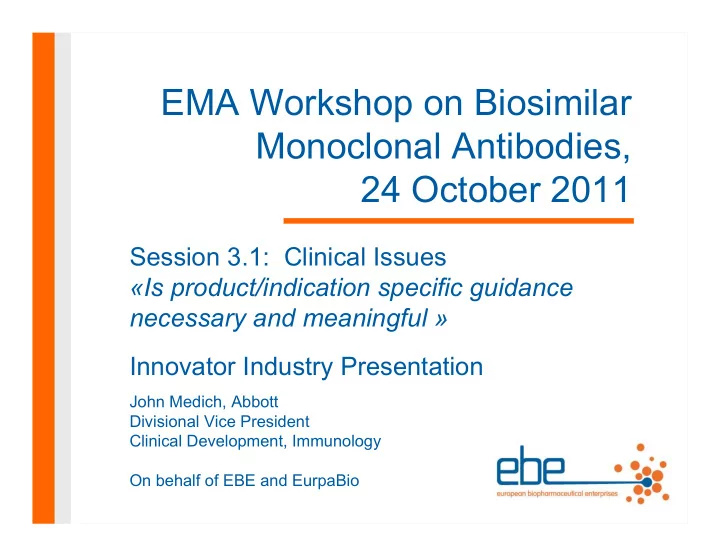

EMA Workshop on Biosimilar Monoclonal Antibodies, 24 October 2011 Session 3.1: Clinical Issues «Is product/indication specific guidance necessary and meaningful » Innovator Industry Presentation John Medich, Abbott Divisional Vice President Clinical Development, Immunology On behalf of EBE and EurpaBio
Topic: Indication/Product Specific Guidance EBE recommends additional specific guidance to improve transparency and benefit development of certain categories of products/product classes EBE considered several classification approaches including: o By class or target (TNF, b-cell, IL-6…) o Broadly by therapeutic area (cytotoxic, immunomodulatory) • Cytotoxic agents can be further segmented into mAbs with and without receptor modulation o By construct (chimeric, humanized, fully human, fusion, fragment) o By indication (Rheumatoid arthritis, NHL, CRC…)
EBE Recommendation Specific guidance may be beneficial for classes of products based • on target TNF blocking agents, b-cell, VEGF… - The rationale for this suggestion is that specific comparability • experiments may be warranted for different classes of molecules and this guidance could be pre-specified to provide consistency in development programmes In addition, specific guidance can be provided for certain classes • as new information is accumulated on biosimilar development programmes Information could be added as annexes for specific drug classes -
Class Specific Guidance B-cell targeted antibody represents one example of a product class needing specific guidance The molecule has multiple mechanisms of action, such • as ADCC, CDC, and apoptotic pathways Different MOAs in different clinical settings may require different - evidence necessary for establishing biosimilarity Host and disease factors may contribute to mode of • action for example: Intact effector mechanisms (complement, NK cells) - CD20 receptor number and density (CLL) - Concomitant medication (steroids, chemotherapy) -
What Should Class Specific Guidelines Include? AS warranted: Requirements for analytic assessments including • effector function testing (regardless of their role in MOA) PK or PK/PD requirements specific to distinct indicated • populations and molecular class Guidance on immunogenicity studies in populations • expected to exhibit different propensities for ADA formation Specific requirements for clinical trials to demonstate • similar efficacy and safety
Recommend
More recommend